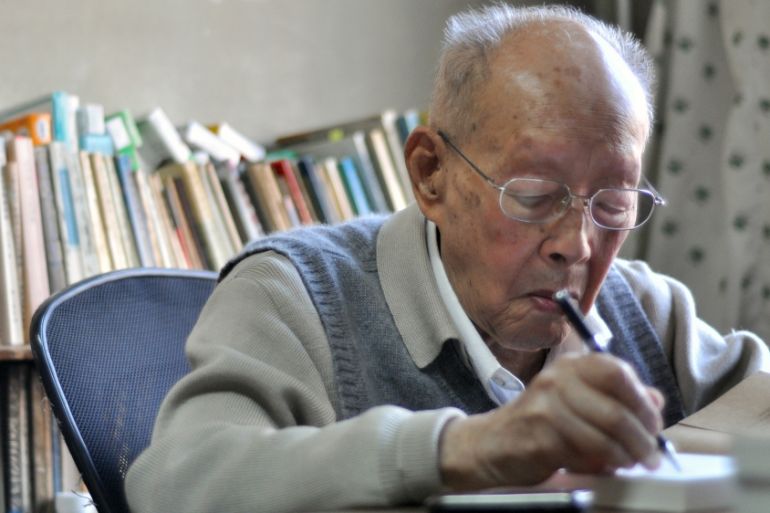Zhou Youguang: Why Google honours him today
Described as the father of Pinyin, or Chinese phonetic language, Google honours the linguist Zhou Youguang.

Described as “the father of Pinyin“, or Chinese phonetic language, and hailed as the man who simplified Chinese, Zhou Youguang would have been 112 this Saturday.
In his honour, Google is changing its logo in 12 countries to a doodle, or illustration, of him and his contribution to Chinese language.
This is his story:
Love for China
-
“Bring light to the world”. Born in Changzhou in 1906, Zhou Youguang showed interest in linguistics at the early age of 12; he graduated from high-school with honours.
-
Named Zhou Yaoping, he adopted the pen name “Yougang” because he wanted to “bring light” to the world.
-
Hard road to university. In 1923, Zhou enrolled the university of St. John’s University, Shanghai. He was not able to attend because of financial woes, but friends and relatives raised the admission fee and helped him pay for tuition.
-
He graduated in 1927, majored in economics and took supplementary coursework in linguistics.
-
Sino-Japanese war. In 1933, he married Zhang Yunhe. He moved to Japan to continue his studies, but returned in 1937, at the start of the Sino-Japanese war.
-
After the Japanese were defeated in 1945 at the end of World War Two, Zhou worked in Sin Hua bank where he was stationed overseas, first in New York City and then in London.
-
“Modern, resurgent China”. In 1949, he returned after the establishment of Communist China, excited to take part in a resurgent country. “We all thought that China had a very good opportunity to develop; we didn’t expect the later turmoil. History misled us,” Zhou told the Guardian.
- Back in China, he taught economics at Fudan University in Shanghai. However, his path did not lead him to remain as an economist.
History misled us
|
|
Romanization of the language
-
Reforming the Chinese language. In 1955, the government placed Zhou at the head of a committee to reform the Chinese language.
- He was called by Zhou Enlai, a person he met in his bank job who was now the second leader in China.
-
“Linguistics was just a hobby”. Zhou initially declined, saying that linguistics was only his hobby, but he was not allowed to refuse the offer. He moved to Beijing, where he began a three-year effort, and developed the invention of Pinyin.
-
A pronunciation guide. Pinyin was made the official romanization in 1958. It is only a pronunciation guide, and not a substitute writing system.
-
“Mao disliked greatly the economists”. His job protected him from Mao’s policies. “Mao disliked greatly the economists – especially economic professors from America,” Zhou said in an in interview. “By that time, I had shifted to the line of language and writing … If I had remained in Shanghai teaching economics, I think I certainly could have been imprisoned for 20 years.”
-
Chinese labour camp. But in 1969. accused of being a reactionary academic, he was sent to work in a labour camp where he worked in the rice fields. He spent more than two years there.
-
Once he was released, he went back home and continued writing about language.
-
Encyclopedia Zhou. In the 1980s, he helped oversee the translation into Chinese of the Encyclopedia Britannica, earning him the nickname of “Encyclopedia Zhou”.
- Critical of the government. Zhou was the author of more than 40 books, many of which were banned for being critical of the government. Around 10 of them were published after he turned 100.
-
He started a blog on Sina and continued blogging until he was 105 years old.
-
Regarding the government, the linguist told AFP: “In all honesty I haven’t got anything good to say about Mao Zedong.”
Chinese people becoming rich isn't important, human progress is ultimately progress towards democracy.